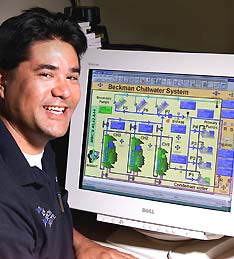Facilities Services Rises to Energy Challenges
By Mika Ono
The Scripps Research Institute (TSRI) experienced its first
rolling blackout this week, when a 90-minute power outage
turned out the lights on Tuesday afternoon at the institute's
Sorrento Valley facility. This rolling blackout followed a
general power outage one evening the previous week, caused
by unrelated technical difficulties on the grid.
“On the whole, we were well prepared for both events,”
says Clyde Brown, director of Facilities Services. "The backup
generators and transfer switches ran flawlessly. And the operators
showed they could rise to a challenge."
The mission of Facilities Services—whose 44 staff members
include machinists, HVAC technicians, electricians, plumbers,
welders, painters, pipe fitters, autoclave experts, metal
fabricators, and locksmiths—is to keep TSRI's buildings
and utilities running. But, while maintenance of the physical
plant has continued uninterrupted, energy has been at the
top of the list of the department's concerns.
Facilities Services staff have been preparing for power
outages by talking through their response and looking for
ways to improve their performance. During the recent outages,
operators successfully patrolled the affected buildings, responded
to problems, monitored the back-up generators, turned off
certain kinds of equipment, and manually opened automatic
garage doors. A new energy hotline, at x4-SEMP(RA) or x4-7367
(or from off campus (858) 784-SEMP(RA)) was also put to use,
offering recorded information on the power situation to those
who called.
To minimize the need for rolling blackouts and to contain
the institute's soaring energy costs, Facilities Services
has also made a concerted effort in energy conservation. Manager
Mariano Albano, who was recently put in charge of energy management,
uses his own office as a showcase of how the institute can
continue to find new ways to conserve.
"Look at this room," Albano says. "It looks bright, right?
But I've removed four out of six of the fluorescent bulbs
in the overhead light." He takes a light meter from its case.
The display reads 32.5 foot candles. "Even using two thirds
fewer bulbs, my office is brighter than the Society of Illumination
Engineers' recommendation for office space illumination."
Albano sees lighting—which constitutes roughly 30 percent
of the institute's energy use—as one of the most promising
areas in which to conserve without compromising the comfort
of TSRI scientists, staff, and students. And turning off lights
also significantly reduces cooling costs. Facilities Services
has turned off cosmetic lighting, for example on the sides
of the buildings and on artwork, and Albano continues to review
the illumination of interior spaces across campus.
Facilities Services is also attentive to other ways of decreasing
energy consumption by upgrading the buildings' equipment,
for example installing high-efficiency motors, variable-frequency
drives, and smaller package units of larger machines.
So far, TSRI's energy use is down six to 30 percent from
last year, depending on the building. "Newer buildings tend
to be more energy-efficient," Brown notes. "There is less
room for improvement."
Albano and Brown emphasize that everyone can help save energy
at TSRI. Their top five energy conservation tips are:
- Turn off the lights when you leave a room;
- Bump thermostats up in the summer to reduce cooling costs;
- Consider using a fan instead of air conditioning if you
feel warm;
- Use cold water whenever possible;
- Close doors to reduce air infiltration from the outside.
"If everyone cooperates, we can continue to reduce energy
use on campus," Albano says. "We all need to work together."

|

Clyde Brown, director of Facilities
Services, emphasizes everyone on campus can help save energy.

Manager Mariano Albano finds new ways
to conserve energy by monitoring the illumination of spaces
across campus.
Energy-related web sites:
|

